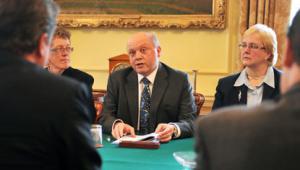4 May 2011
An influential report on the competition aspects of the government’s proposed NHS shake-up is being drawn up, a key figure said today.
Sir Stephen Bubb, chief executive of the Association of Chief Executives of Voluntary Organisations, is a member of the NHS Future Forum, set up by the government to examine the Health and Social Care Bill. The controversial legislation was put on hold last month as the government launched its ‘listening exercise’.
Bubb is leading on the choice and competition parts of the Bill, which would transfer health care commissioning from primary care trusts to GP consortiums and open up the provision of services to‘any willing provider’. Speaking this morning at an event organised by the King's Fund health think-tank, he revealed he had three weeks to produce recommendations for the forum, which is chaired by Professor Steve Field. Bubb said his workwas concentrating on the role of NHS foundation trust regulator Monitor, which is due to become economic regulator for all health and adult social care in England and have a duty for promoting competition.
Bubb said he would ask whether it was ‘the job of the NHS to promote competition’. He added that if opening up the NHS market did not lead to more provision by social enterprises and charities, the changes would have failed.
‘I have been listening to social enterprises in the past ten years, and one thing I am very clear about is that our health service keeps charities and social enterprises too much at the margins. It doesn’t exploit their potential properly and the reform process has to change that,’ he said.
‘There are a lot of very good organisations, particularly in the long-term conditions sector. How are we going to encourage a bigger role for them?’
Other speakers at the King’s Fund event, the NHS and public service reform – choice and competition, talked about existing competition in the health service.
Professor Carol Propper, head of the health care management group at Imperial College London, said the ‘choose and book’ reforms by the Labour government to provide patient choice in the NHS from 2005 had brought benefits and did not appear to bring any costs. Quality went up on some measures and costs did not rise more for hospitals that were exposed to competition.
Dr Stephen Dunn, director of strategy at NHS East of England, outlined the work that had been done to sign the first franchise for an NHS hospital. Huntingdonshire’s Hinchingbrooke hospital will be run by the Circle healthcare social enterprise for a ten-year term. In this period, the company is planning to repay all the hospital’s historic debt and no subsidy will be required.
Dunn said that this kind of competition was a change from the previous government’s policy. The franchise was a form of ‘competition for the market rather than in the market’.
This is similar to the competition in the rail industry for train franchises, according to Anna Walker, chair of the Office of Rail Regulation and former chief executive of the Healthcare Commission. She said that her experience indicated that such franchises could be used more widely for hospitals, as part of harnessing the ‘huge value’ of comparative competition.
‘People think of competition as public against private sector, but it doesn’t have to be that. There is a huge value in comparing organisations, publishing information and driving better performance and value for money through that route,’ she said.




















